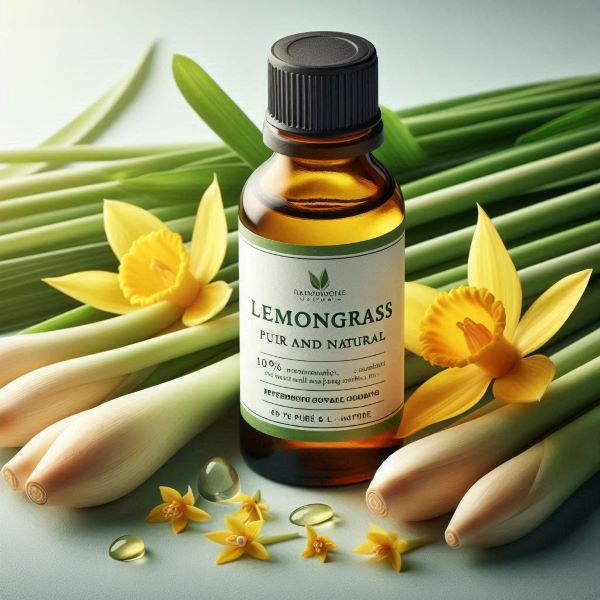Lemongrass oil, extracted from the leaves and stalks of the lemongrass plant (Cymbopogon citratus), is a versatile essential oil known for its fresh, citrusy scent and a wide range of therapeutic benefits. Native to tropical regions like Southeast Asia, India, and Sri Lanka, lemongrass has been used for centuries in traditional medicine and cuisine. Today, lemongrass oil is popular in aromatherapy, skincare, and natural remedies for its potent antimicrobial, anti-inflammatory, and analgesic properties. This comprehensive article explores the nutritional profile, benefits, uses, therapeutic advantages, properties, side effects, interesting facts, and scientific evidence related to lemongrass oil.
Nutritional Profile of Lemongrass Oil
It contains a rich blend of chemical compounds that contribute to its health benefits:
- Citral (Geranial and Neral): 70-85%
- Myrcene: 10-12%
- Limonene
- Citronellal
- Geraniol
These components give lemongrass oil its characteristic aroma and potent therapeutic properties.
Benefits of Lemongrass Oil
1. Antimicrobial Properties
- Antibacterial: Effective against a range of bacteria, making it useful for treating infections and wounds.
- Antifungal: Can combat fungal infections such as athlete’s foot and yeast infections.
- Antiviral: Shows potential in inhibiting the growth of viruses.
2. Anti-inflammatory and Analgesic Effects
- Reduces Inflammation: Helps alleviate inflammatory conditions like arthritis and rheumatism.
- Pain Relief: Provides relief from muscle pain, headaches, and joint pain.
3. Digestive Health
- Digestive Aid: Promotes healthy digestion and helps relieve symptoms of indigestion, bloating, and constipation.
- Antispasmodic: Reduces spasms in the digestive tract, aiding in the treatment of gastrointestinal issues.
4. Stress and Anxiety Relief
- Calming Effect: Its fresh, citrusy aroma has a calming effect on the mind, reducing stress and anxiety.
- Aromatherapy: Used in diffusers and massage oils to promote relaxation and mental clarity.
Uses of Lemongrass Oil
Aromatherapy
- Diffuser: Adding a few drops to a diffuser can freshen the air and promote relaxation.
- Massage Oil: Diluted with a carrier oil, it can be used for a soothing massage to relieve muscle pain and stress.
Topical Applications
- Skin Care: Used in skin care products for its antibacterial and antifungal properties.
- Insect Repellent: Effective in repelling mosquitoes and other insects when applied to the skin.
Culinary Uses
- Flavoring Agent: Used in small quantities to flavor foods and beverages, particularly in Asian cuisine.
- Tea: A few drops added to tea can provide digestive benefits and a refreshing flavor.
Therapeutic Advantages
It offers several therapeutic benefits:
- Antimicrobial: Effective against a wide range of pathogens, including bacteria, fungi, and viruses.
- Anti-Inflammatory: Reduces inflammation and alleviates pain, making it beneficial for conditions like arthritis.
- Digestive Health: Promotes healthy digestion and reduces symptoms of gastrointestinal discomfort.
- Mental Clarity: Enhances mood and reduces stress and anxiety through its calming aroma.
Properties of Lemongrass Oil
- Antimicrobial: Kills or inhibits the growth of bacteria, fungi, and viruses.
- Anti-Inflammatory: Reduces inflammation and pain.
- Analgesic: Provides pain relief.
- Digestive Aid: Promotes healthy digestion and relieves gastrointestinal discomfort.
- Aromatic: Fresh, citrusy scent that invigorates and soothes the mind.
Also, read: All You Need to Know about Eucalyptus Oil Now
Side Effects
While it is generally safe when used properly, some individuals may experience:
- Skin Irritation: This can cause irritation or allergic reactions when applied directly to the skin without dilution.
- Photosensitivity: This may increase the skin’s sensitivity to sunlight, leading to sunburn.
- Pregnancy: Pregnant women should consult a healthcare provider before using lemongrass oil.
Interesting Facts
- Traditional Medicine: Lemongrass has been used in traditional medicine systems like Ayurveda and Traditional Chinese Medicine for centuries.
- Culinary Use: A staple ingredient in Thai, Vietnamese, and other Southeast Asian cuisines.
- Insect Repellent: Commonly used as a natural insect repellent in tropical regions.
Scientific Evidence
Numerous studies support the health benefits of lemongrass oil:
- Antimicrobial Activity: Research published in the Journal of Applied Microbiology demonstrates lemongrass oil’s effectiveness against a wide range of bacteria and fungi. (Source)
- Anti-Inflammatory Effects: A study in Food and Chemical Toxicology highlighted the anti-inflammatory and analgesic properties of lemongrass oil, confirming its use in treating inflammatory conditions. (Source)
- Digestive Health: Research in the Journal of Ethnopharmacology supports the use of lemongrass oil in promoting healthy digestion and alleviating gastrointestinal discomfort. (Source)
Conclusion
Lemongrass oil is a versatile and potent essential oil with a rich history of use in traditional medicine and modern aromatherapy. Its wide range of benefits, from antimicrobial properties and pain relief to digestive health and stress reduction, make it a valuable addition to any natural remedy toolkit. While generally safe, it is essential to use lemongrass oil properly and be aware of potential side effects. Supported by scientific evidence, lemongrass oil continues to be a popular and effective natural remedy for various health concerns.





